Ancestors: The Humankind Odyssey Review
Fumbling in the Jungle
Ever since Minecraft took the world by storm, the genre of survival crafting games has exploded, with a pretty staggering number of games that typically involve exploring an open world, collecting resources and combining them in various ways to progress. Despite being a crowded genre, new development team Panache Games have entered into the fray with a very unique spin on the well-worn concept. Set in a prehistoric era and spanning millions of years, Ancestors: The Humankind Odyssey involves playing as human predecessors - primates who learn and evolve. Though certainly unique, the end result is ultimately quite uneven and you will want to have some idea of what you are getting yourself into before jumping in with this one.
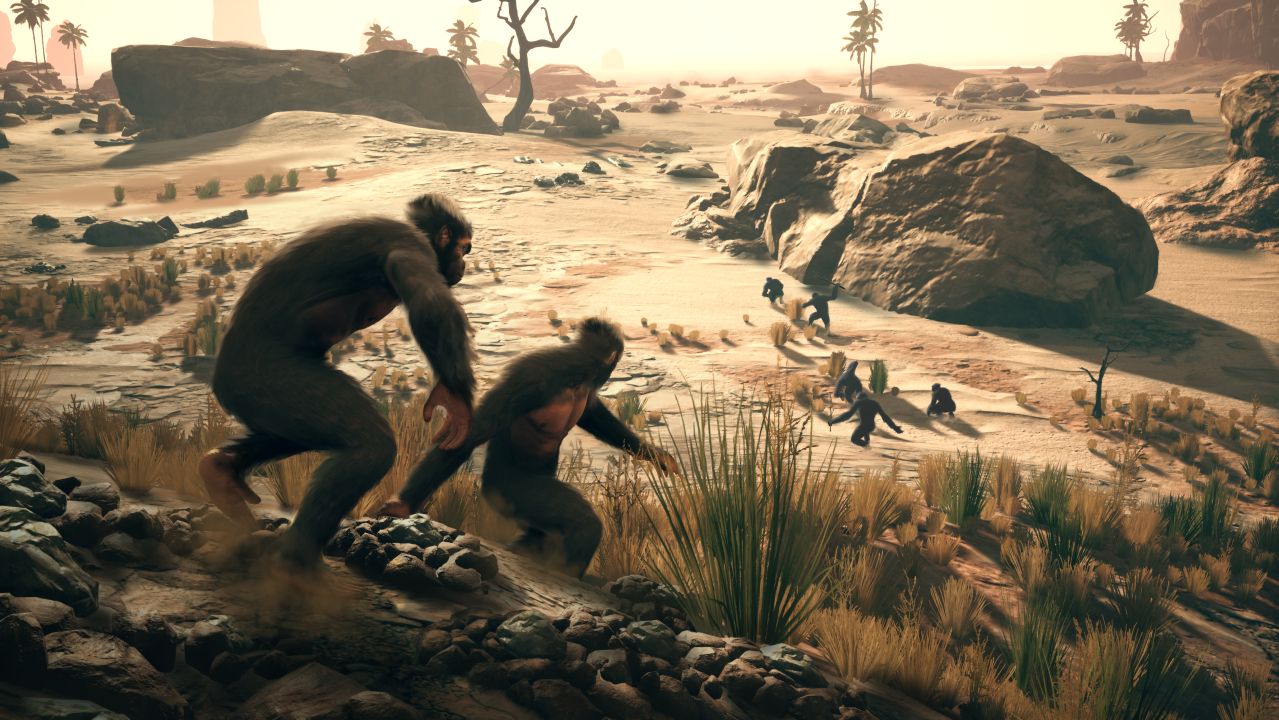
In a nutshell, Ancestors sees you taking control of a clan of primates in an undisclosed jungle and savannah-covered region of Africa ten million years in the past. You are tasked with ensuring the survival and evolution across multiple generations. The longer you keep your lineage alive, the further opportunity they will have to learn new skills and retain knowledge that can be passed down. Though you only directly control one ape at a time, you can switch between members of your hominid clan. As you advance through generations, you evolve your linage and see how your progress roughly aligns with how our ancestors actually evolved based on scientific estimates.
One thing that Ancestors does have in common with other survival games is an intentionally cryptic learning curve. Even with the tutorial turned on to provide as much help as possible, you are left to figure a lot out for yourself, in an effort to have the player experience the same thing as our distant ancestors. When you first start out, your immediate priority will be meeting the basic needs of your clan; eating, drinking and sleeping. Though it doesn’t take long to figure out how to accomplish this, there are still some dangers such as food that will poison you. Some foods will also provide unique benefits like increasing the warmth of your character or providing resistance to injuries.
If you fail to properly manage your basic needs, you will suffer a penalty to your energy levels, which determine how far you can climb, run or perform other actions before needing to rest. If you strain a primate too much, you risk a reduction in their overall health, that also limits the maximum amount of energy. Energy is crucial early on as your clan will start in the jungle full of predators such as snakes and large cats, and your best bet for avoiding these is clambering up the cliffs and trees that are abundant in the region.
Unfortunately, as you venture into the jungle and start encountering predators, the first real issues with the game start to rear their head. For a game that involves a lot of climbing in complex terrain, the controls are unwieldy. You can sometimes climb up branches easily, but if you turn around and try and go down, your character might not move unless you press a button to lower yourself, or jump to another branch. You aren’t given any real control over how far you jump, so you will frequently send yourself hurling from the top of a tree all the way down to the ground, towards certain injury or death.
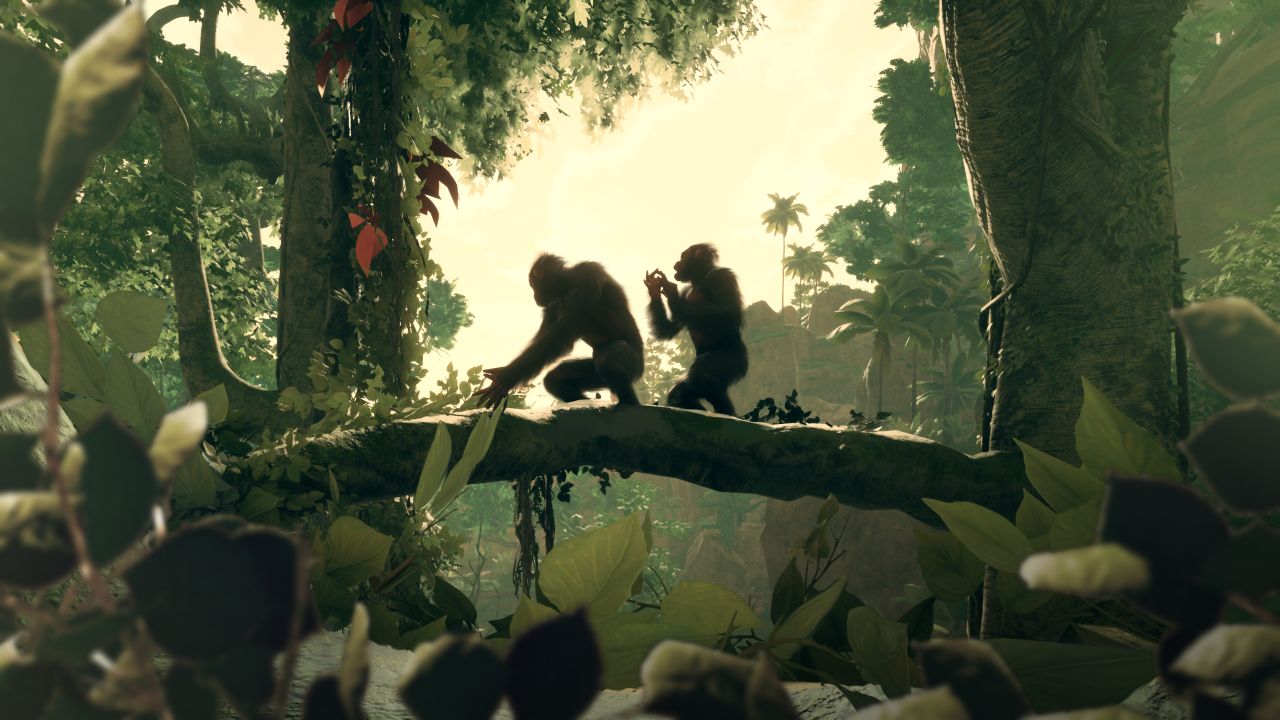
When jumping between trees, branches and rocks, your ape will automatically grab onto some things, but if you want to grab a vine or swing from a branch, you will need to press a button at a specific time. When falling through branches and canopy, it can be difficult to tell if you need to press this button, or simply let your character grab onto something automatically. Swinging around the trees as a monkey seems like a great opportunity for some unique mechanics that would make traversing the environments a joy, but instead the climbing always felt clumsy even after spending significant amount of time with the game.
Encounters with predators don’t fare much better and can compound the climbing issues. The jungle is full of things that want to kill you - like panthers, eagles, warthogs, snakes - and these things are pretty adept at sneaking up on you unnoticed, even if you occasionally use your keen hearing and sense of smell to suss out nearby threats. When you encounter a predator and it attacks, your only initial option is to dodge out of the way with a finicky slow-motion mini-game, and run to the nearest tree or cliff. The dodging mechanic, as well as several other mechanics in the game, rely on audio cues for timing, however the game never tells you this crucial bit of information, and even when you do know about it, this the cue is easy to miss. So for the first several hours of gameplay I greatly struggled to dodge attacks. While some attacks from predators will give minor injuries that heal with time, some will kill you outright, while others will cause you to bleed. It just so happens that the latter are the ones that are seemingly the best at sneaking up on you and the hardest to dodge.
Once your character is bleeding, your only hope is to find a plant that grows high up in trees to bandage your wounds before you bleed out, usually found on thin branches that are finicky to climb on. So I often found myself stuck in a truly infuriating cycle of getting attacked by a predator, desperately climbing up into the canopies of tall trees to find the required item, only to mess up the climbing and fall back to the ground where my character would sustain an injury and invariably encounter the same predator waiting patiently. This frustrating cycle caused me to lose a lot of my clan members early on. You can try and lead predators towards another, which will sometimes result in them killing each other, but this is only occasionally possible. Eventually you can make use of rocks and sticks to perform counter attacks that let you kill a predator, but the tougher ones, and the same ones that cause you to bleed, need to be hit multiple times to take them down.
Other aspects of the learning experience are also mixed. There were some cool learning moments here and there, like the first time I tried crossing a larger river and found myself getting swept downstream towards a huge waterfall, or the first time I realized you can explore with your entire clan in tow and jump up and down on trees whooping and screaming as a group to scare away predators. You can find other primates when exploring that can join your clan if you figure out what they need, based on their animations that correspond to some specific item, which you'll need to decipher.
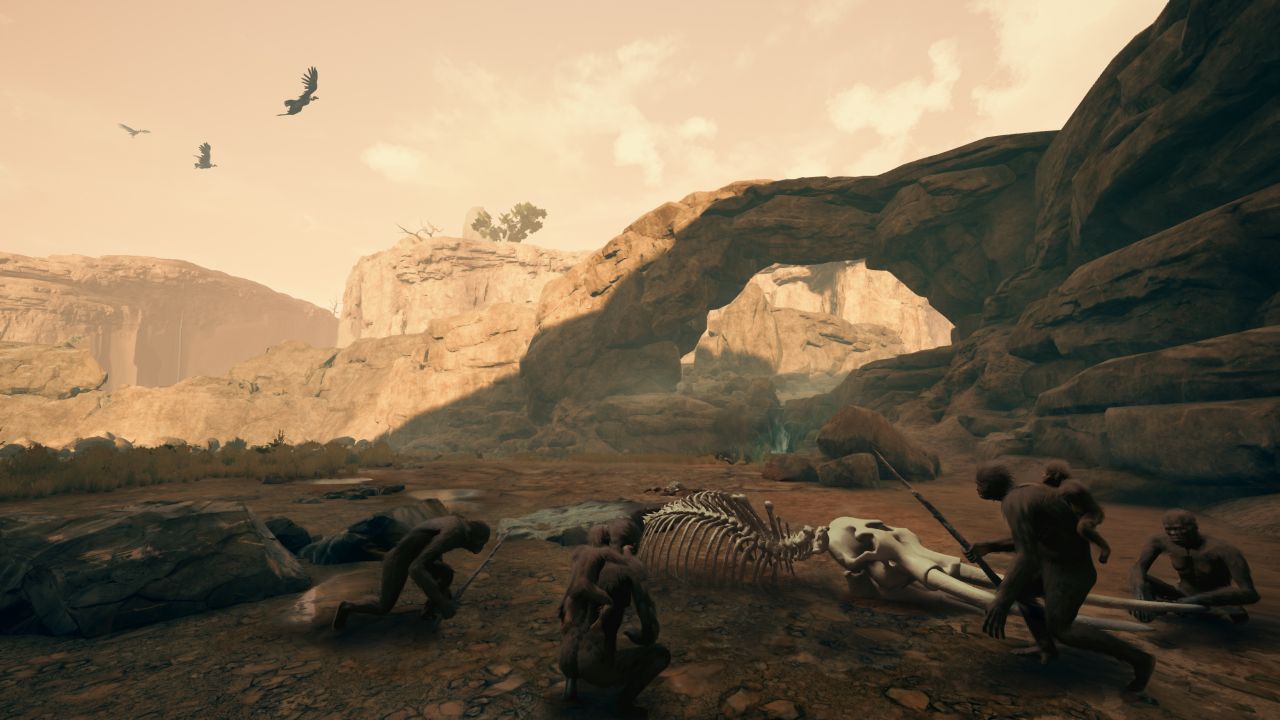
Sadly, much of the gameplay and learning is far more tedious. After a little while you will gain the ability to hold objects in both hands and try and manipulate them. For example, if you find a sharp piece of obsidian, you can turn a branch into a pointy stick which can serve as a weapon or as a way to pry open large rocks and access items hidden underneath. However, you are given zero clues as to what you can craft, so figuring these things out is a completely trial-and-error based process, and you will end up spending a lot of time smashing random objects together to see if something productive happens.
You can also build some basic structures such as wooden barricades to keep predators out of your clan settlement, and discovering these is similarly trial-and-error based; you simply put a bunch of objects in a pile and eventually are prompted to begin construction if your pile happens to have the right items in it. All of this is made even more tedious by the fact that you will need to carry objects to a location safe from predators if you want to experiment without being constantly interrupted by attacks. You aren’t even told how to construct the most basic object, a bed of leaves that serves as a way to create a new settlement for your clan and upgrade your clan’s knowledge and skills.
The skill upgrade and generation-changing systems are perhaps the most successful aspect of the game. If a male and female in your clan aren’t directly related, they can form a couple by grooming each other and mate, allowing female primates to give birth to children. When you are around children or even giving them a piggy-back ride, you will gain neural energy which serves as the game’s XP system. Once you craft a bed, you can spend neural energy to unlock upgrades that initially introduce basic elements like the ability to manipulate items and later grant access to unlocks that makes dodging/counter attacks easier, or provides other benefits like a higher resistance to bleeding or injuries. What skills you unlock will depend on how you play the game, so every player’s progression will be quite different depending on what they do first.
However, upgrades will only be temporary until you shift to a new generation and ‘reinforce’ them, which allows subsequent generations of your clan to permanently retain the benefits. Once you decide to shift to a new generation, children will become adults, adults will become elders and any elders in your clan will pass away. Ensuring the success of your lineage involves having enough surviving clan members to continue moving through generations. If you only have a single couple in your clan, even if you have multiple children they will be directly related and unable to reproduce, so it is beneficial to have multiple couples per generation. If all members of your clan perish, it is game over, and there is no way to revert to an earlier save. This harsh save system is exactly as you'd expect in similar survival titles, and restarting involves going through the same motions yet again.
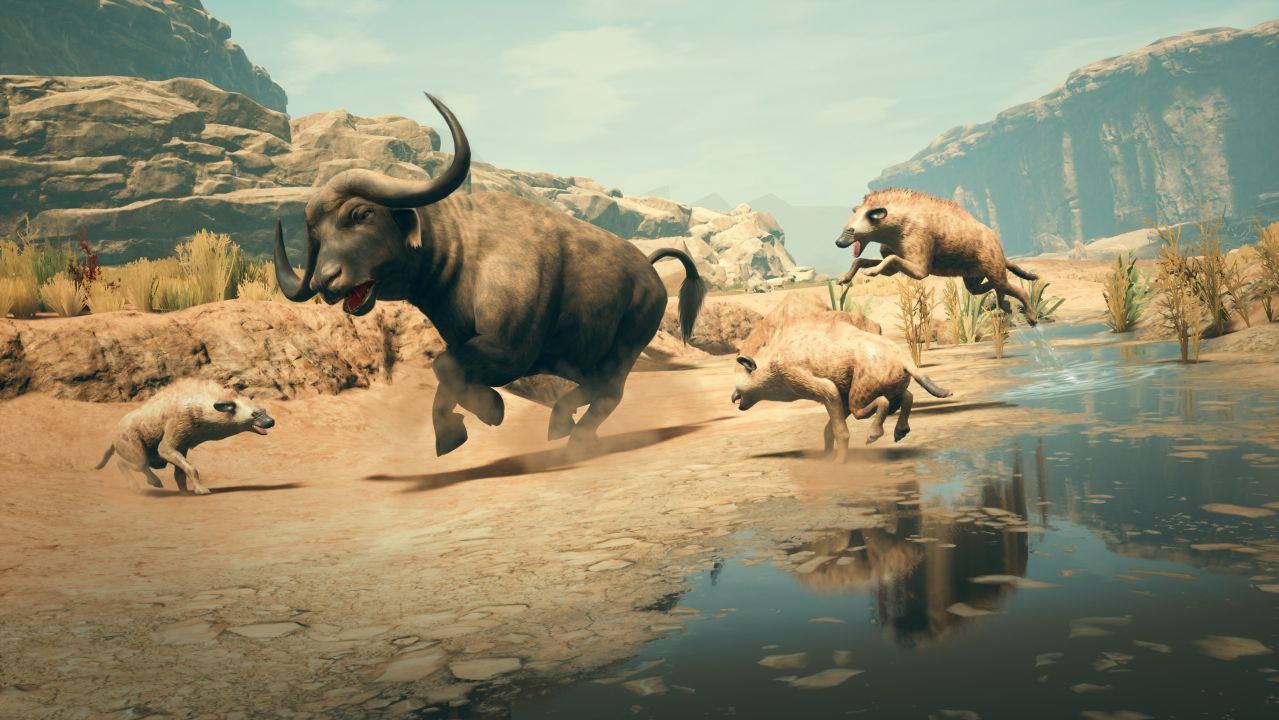
Once you have progressed past at least one generation and have made a sufficient number of discoveries, you can choose to evolve your lineage, which will shoot time forwards by tens or even hundreds of thousands of years depending on how many feats of evolution you completed, and give you an indication of how your clan’s evolution compares to scientific estimates. After this process, you will rejoin you clan at a new seemingly random location in the map which will make it easier to explore new territory.
Exploration is the final component of Ancestors, and this is probably the part of the game I enjoyed the most, though it is not without its issues as well. At any time, you can go into ‘intelligence’ mode which will let you see nearby objects that can be interacted with, and distant note-worthy locations to discover. You are encouraged to explore, since all these actions help you evolve your clan. If you venture far enough from your known territory, your primate will start to experience ‘fear of the unknown’ which takes the form of an obnoxious filter over the screen with visions of predators and scary sound effects. This is an odd mechanic that mostly just gets in the way of exploration. To conquer your fear, you must identify familiar objects in the new territory, then follow some white lights until you hit a particular spot and beat your chest and screech for a moment, thus perhaps claiming it.
You will also need to manage dopamine levels, which will drop when your primate is fearful; if you fail to conquer your fear in a new area fast enough and your dopamine levels run out, your ape will freak out and be kicked back to your clan’s settlement. Since there is no fast travel, this can be a pretty significant setback as traversing the jungle is a fairly slow process. This is a shame, because the game world in Ancestors is large, detailed and fun to explore when you don’t need to deal with the fear mechanic.
Visually, Ancestors looks good for a lower priced game, producing solid visual quality on Unreal Engine 4. The dense jungles and cliffs of the early areas eventually give way to more open savannah terrain where you will need to rely on combat to deal with predators, with less opportunities to escape into the trees. Some visual effects can be a bit annoying though, like when experiencing fear or poisoning. The audio is solid enough; primates having some authentic sounding screeching and hollering, and the sound of snakes and growls of prehistoric predatory cats providing the best way to detect a nearby threat. The music is quite good as well with low-key orchestral tracks accompanying more peaceful moments and tribal drums kicking off during encounters with hostile predators. I didn’t encounter any real issues with performance or game stability either.
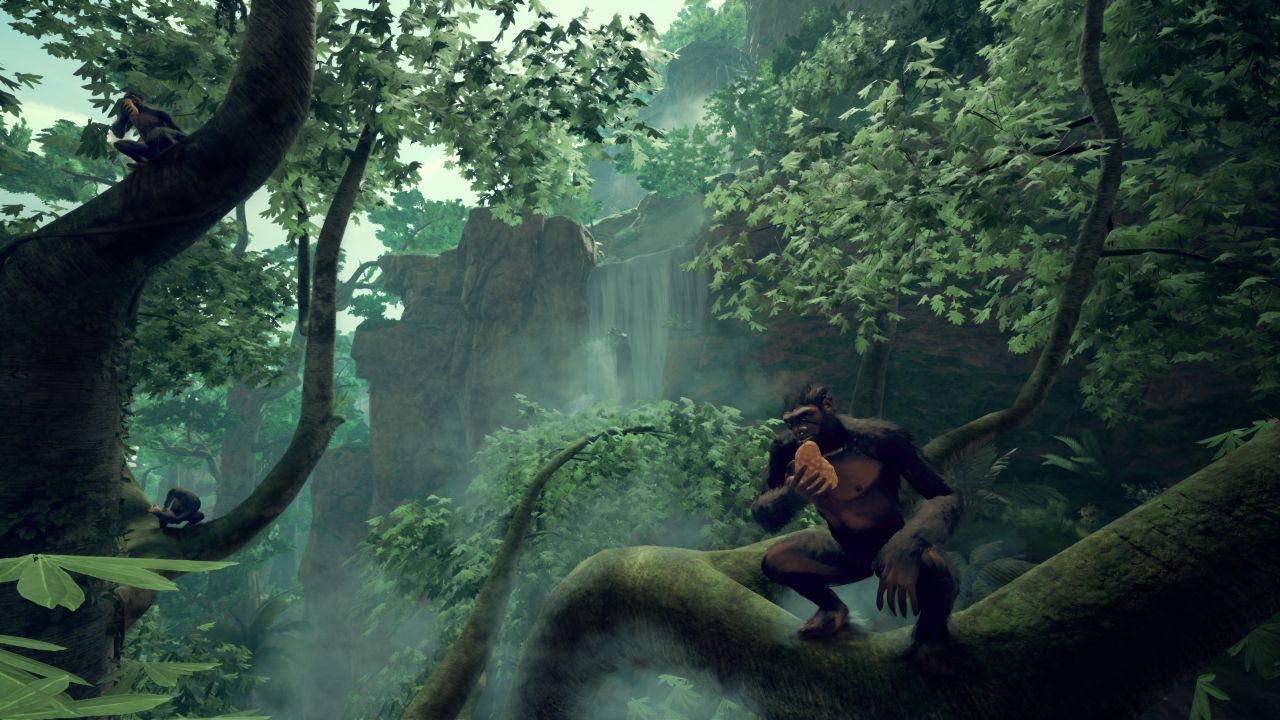
Ancestors: The Humankind Odyssey deserves a lot of credit for taking a unique and original approach to the survival genre. There are moments when out exploring new areas and encountering new dangers, or when making discoveries on how to use some seemingly useless objects in interesting new ways, that you can see what Panache Digital Games were going for. Unfortunately, you will need to wade through a considerable amount of frustration and tedium with the game’s controls and learning curve to find these moments. The disposable nature and un-varied appearances of individual primates in your clan make it difficult to get attached or truly care about the fate of any one of them. Those who enjoy a more free-form gameplay experience and are craving something unique might consider taking a look at Ancestors, but be warned of its shortfalls and frustrations.
 Comments
Comments














